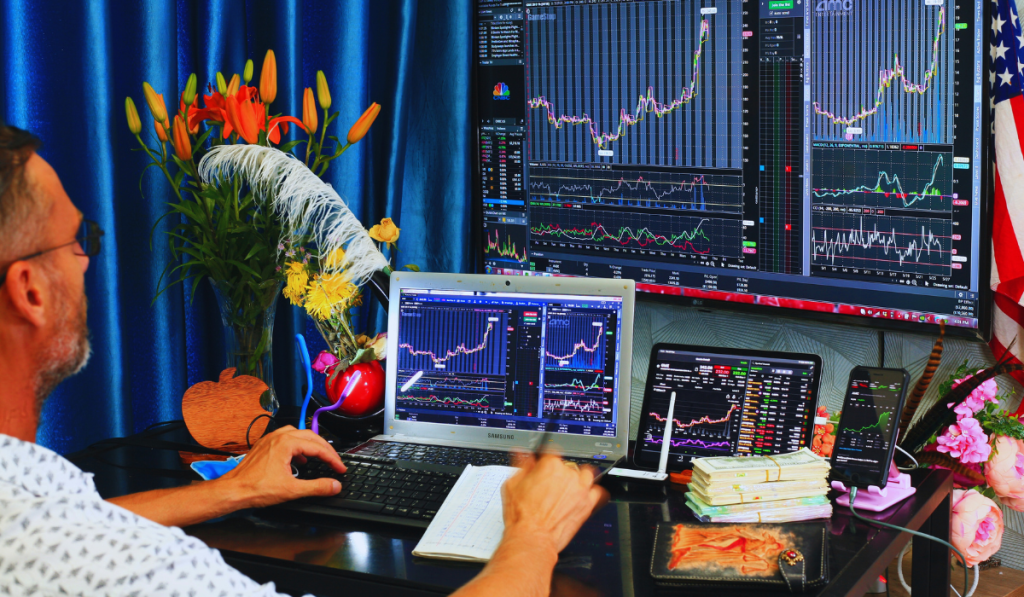What is trading forex?
In the digitally connected economy of today, money is not limited to national borders.It moves continuously across nations, frequently going unnoticed by the general public.The foreign exchange market, sometimes known as forex or FX, is the driving force behind this worldwide flow of money.For a lot of people, this area presents both financial potential and an intriguing look at the real-time interactions between currencies.
To appreciate one of the biggest and most liquid markets in the world, you must first understand what forex trading is. Exchange rates, economic trends, and a rhythm that never really stops, even while most markets are dozing off, drive this universe.

The Forex Market’s Worldwide Presence
The buying and selling of currencies is known as foreign exchange, or forex. The forex market is open twenty-four hours a day, five days a week, in contrast to traditional stock exchanges that are restricted to certain locations and business hours. It starts in Asia, moves through Europe, and ends in North America, resulting in an ongoing trade cycle.
Making money off of shifts in the value of one currency in relation to another is the aim of forex trading . Pairs of currencies, such as USD/JPY (U.S. dollar and Japanese yen) or GBP/USD (British pound and U.S. dollar), are used for trading. In relation to the second currency (quote currency), traders make predictions about whether the first currency in the pair (referred to as the base currency) will increase or decrease.
This goes beyond theory. Participants in this exchange include governments, financial organisations, multinational businesses, and individual traders. In international finance, the currency market is essential for both risk hedging and profit-seeking.
Why Forex Trading Is Different
It’s crucial to examine how forex differs from other financial instruments in order to comprehend what it means to trade it practically.
Abundant liquidity
Since currencies form the basis of international trade, the FX market sees daily activity of approximately $7 trillion.Even when significant sums are involved, trades may be initiated and withdrawn with no price disturbance due to this unparalleled liquidity.
Take Advantage of Possibilities
Leverage, which enables traders to manage a sizable position with a comparatively small amount of money, is frequently used in forex trading. For example, a trader may manage $100,000 with just $1,000 in their trading account when the leverage ratio is 1:100. Leverage can improve earnings, but it also raises the possibility of losses, which is why risk management is so important.
24-hour accessibility
London, Tokyo, New York, and Sydney are just a few of the main financial centres where the currency market is always active. This implies that traders can respond right away to breaking news or the publication of economic data from anywhere in the world.
Minimal Entry Barriers
Forex trading is comparatively accessible, in contrast to other markets that could want significant funds or broker contacts.New traders may get started with little financial commitment because to the cheap minimum deposits and demo accounts offered by many brokers.
Fundamentals of Forex Trading
Knowing how deals are managed and performed is also necessary to comprehend what forex trading is.
Supply and demand determine how currency pairings fluctuate.Price variations are influenced by a number of factors, including central bank policies, geopolitical happenings, and economic data. Traders use technical or fundamental analysis to examine these variables.
Examining economic statistics such as GDP growth, inflation, employment figures, and central bank statements is known as fundamental analysis.
Technical analysis: Based on past performance, this method forecasts future market moves using price charts, patterns, and indicators.
Traders go long when they think a currency will gain strength.They go short if they anticipate a currency’s depreciation.Pips, the smallest unit of price change for a currency pair, are used to quantify each trade.
The Forex Players
There is tremendous diversity in the FX market. A mong the important participants are:
- Governments and central banks utilise foreign exchange to control monetary policy or to step in and stabilise currencies.
- Commercial banks serve as middlemen and enable significant currency transactions.
- Businesses: Use forex to control the risk associated with overseas operations and foreign invoicing.
- Institutional Traders: As part of their larger plans, hedge funds, asset managers, and investment organisations engage in currency trading.
Retail traders are those who use internet platforms to trade from the comfort of their own homes.With the development of technology and broker access, this market has expanded dramatically.
Risk Control: An Essential Component of Forex
A key element of FX trading is risk control. Even while there may be a lot of possibilities for profit, losses might happen just as fast. Traders may better manage their exposure by utilising techniques like as leverage restrictions, position size, and stop-loss orders.
Emotional discipline is another important idea a.Many traders fail owing to rash actions motivated by greed or fear rather than bad strategy. Maintaining consistency under pressure and adhering to a well-thought-out plan are essential components of successful forex trading.
Creating a Strategy for Forex Trading
Without a strategy, trading forex is like trying to find your way around a new city without a map. A solid trading strategy consists of:
Well-defined Objectives: What do you hope to accomplish, whether it’s long-term growth, daily revenue, or another goal?
- Defined Strategy: Predicated on news events, technological configurations, or a mix of the two.
- Limiting the amount of risk per trade or day is known as a risk control measure.
- Trade Log: You may learn from both victories and losses by keeping a record of your previous deals.
Here at JoinX Capital, we place a strong emphasis on education and readiness.A solid strategy greatly improves your prospects of long-term success, but it won’t ensure profits.
The Emotional Aspects of Foreign Exchange Trading
Gaining an understanding of forex trading also entails having the necessary attitude. Emotional regulation, perseverance, and patience are just as important as technical proficiency.Markets will put your approach, convictions, and responses to the test.
